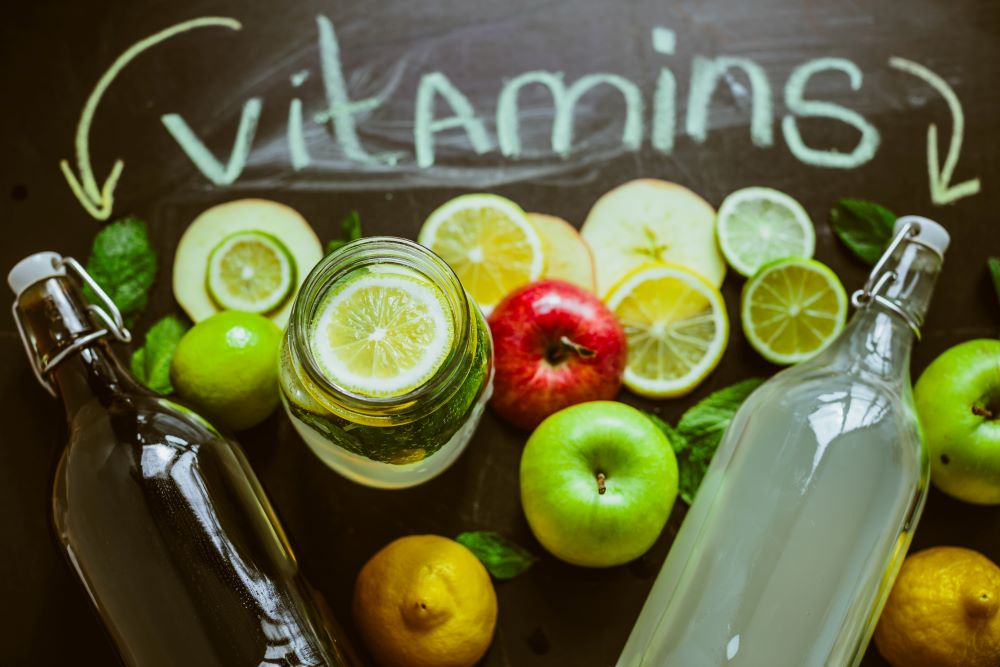What Vitamins & Supplements are Good for Improving Lungs Health?

With a steep rise in the cases of chronic lung ailments in recent years, it is imperative to be watchful of your lung health. Here, the consumption of essential vitamins can improve their condition, ensuring they function properly. Chronic lung conditions such as asthma, COPD, and lung infections significantly impact quality of life, making it crucial to take proactive steps in maintaining lung health.
Therefore, allow us to elaborate on the essential vitamins for the lungs. Vitamins and certain supplements play vital roles in maintaining the respiratory system's health. Incorporating them into your diet can significantly contribute to better lung health. Let’s begin this journey towards healthier lungs!

Table of Contents

Best Vitamins & Supplements for Lung Health
Maintaining lung health is crucial, especially with the rise in respiratory ailments. Vitamins and supplements can play a significant role in supporting lung function. Given below are some of the best vitamins and supplements for lung repair:
Best Sources of Essential Vitamins & Supplements for Lung Health

Ensuring lung health involves incorporating essential vitamins and supplements. Following
the best dietary and supplemental sources to support your respiratory system:
Daily Intake of Vitamins & Supplements for Healthy Lungs
Maintaining lung health requires a balanced intake of essential vitamins and supplements. Below is a table explaining the recommended daily intake limits for various vitamins and supplements for adults and children.
Useful Tools to Track Your Health
Role of Vitamins & Supplements for Healthy Lungs

Maintaining liver health is essential for overall well-being, as the liver plays a crucial role in detoxification, metabolism, and digestion. Below is a table explaining the benefits of various vitamins and supplements for liver health.
How to Support Lung Health in Your Daily Routine?
Maintaining lung health is crucial for overall well-being and can significantly impact your quality of life. Here are some effective ways to support and enhance your lung health:
- Avoid Smoking and Secondhand Smoke: Smoking is the leading cause of lung diseases. Avoid smoking and steer clear of secondhand smoke to protect your lungs from harmful toxins.
- Exercise Regularly: Regular physical activity strengthens your lungs and improves their capacity. Incorporate aerobic exercises like walking, running, or swimming into your routine to enhance lung function.
- Maintain Good Indoor Air Quality: Ensure your living space is well-ventilated and free from pollutants. Use air purifiers and keep your home clean to reduce dust, mould, and other irritants that can affect your lungs.
- Practice Deep Breathing Exercises: Deep breathing exercises can help expand your lung capacity and improve oxygen intake. Practice techniques like diaphragmatic breathing or yoga to boost lung efficiency.
- Stay Hydrated: Drinking plenty of water and staying hydrated helps thin mucus in the lungs, making it easier to breathe. Adequate hydration supports overall lung function and leads to a healthy lifestyle.
How to Boost Vitamin Levels for Lung Health?
Ensuring adequate vitamin intake is vital for maintaining and improving lung health. Here are some key ways to boost your vitamin levels effectively:
- Increase Vitamin C Intake: Vitamin C is a powerful antioxidant that helps protect the lungs from damage. To boost your vitamin C levels, incorporate more citrus fruits, bell peppers, and strawberries into your diet.
- Consume Vitamin D-Rich Foods: Vitamin D supports immune function and lung health. Include fatty fish, fortified dairy products, and egg yolks in your diet, and get regular sunlight exposure to maintain healthy vitamin D levels.
- Add Vitamin E to Your Diet: Vitamin E has antioxidant properties that can help protect lung tissue from damage. To increase your vitamin E intake, include nuts, seeds, and green leafy vegetables in your meals.
- Eat Foods High in Vitamin A: Vitamin A is essential for maintaining the mucous membranes lining the respiratory tract. Boost your vitamin A levels by consuming carrots, sweet potatoes, and dark leafy greens.
- Incorporate B Vitamins: B vitamins, particularly B6 and B12, are crucial in maintaining healthy lung function. Foods such as whole grains, beans, and poultry are excellent sources of B vitamins.
- Consider a Multivitamin Supplement: If you struggle to get enough vitamins through diet alone, consider taking a multivitamin supplement. Consult a healthcare provider to find a suitable option that meets your nutritional needs.
Vitamin Deficiency Diseases Linked to Poor Lung Health
- Scurvy results from a lack of vitamin C and can lead to weakened lung tissues and increased susceptibility to respiratory infections due to impaired immune function.
- A deficiency in vitamin D can cause rickets, which affects bone health and weakens the immune system, increasing the risk of respiratory infections and reduced lung function.
- Lack of vitamin B12 can lead to pernicious anaemia, causing fatigue, shortness of breath, and reduced oxygen transport in the blood, which can negatively impact lung health.
- Vitamin A deficiency can cause night blindness and increase vulnerability to respiratory infections due to its role in maintaining mucosal surfaces in the lungs.
- Without enough vitamin E, the lungs can suffer from increased oxidative stress and inflammation, leading to conditions like chronic obstructive pulmonary disease (COPD) and asthma.
Effects of Long-term Vitamin Deficiency on Lungs
Long-term vitamin deficiency can severely impact lung health, leading to decreased lung function and increased vulnerability to respiratory infections. The immune system weakens without essential vitamins, making the respiratory tract more susceptible to inflammation and disease.
Deficiencies can result in increased oxidative stress, damage to lung tissue, and a higher risk of chronic conditions.
Furthermore, inadequate vitamin levels can impair the maintenance of mucosal surfaces in the lungs, leading to higher infection rates and chronic respiratory issues. Maintaining adequate vitamin intake is crucial for supporting lung health and preventing long-term respiratory complications.
Should You Take a Lung Health Supplement?
A lung health supplement can be beneficial, especially if you struggle to get enough nutrients through your diet alone. Supplements that contain vitamins such as A, C, D, and E, along with minerals like magnesium and zinc, can support lung function and enhance your immune system.
However, it's important to consult with a healthcare provider before starting any supplement regimen to ensure it is safe and appropriate for your individual health needs. While supplements can help fill nutritional gaps, they should complement a balanced diet and healthy lifestyle rather than replace them.
Which Vitamin Deficiency Is Associated With Causing Harm to the Lungs?
As per studies, a severe deficiency of vitamin D is linked with lung ailments. According to Medical News Today, recent research has found that interstitial lung disease (ILD) is associated with low vitamin D levels.
Additionally, researchers found that CT scans of lungs of individuals lacking adequate levels of this vitamin showed a higher amount of spots, which indicated damaged tissues. This was in comparison to those individuals who had optimal levels of vitamin D.
This brings this article to an end, and by now, you have surely developed an idea about some of the best vitamins for the lungs. So if you are looking forward to consuming vitamins for healthy lungs, go ahead and ensure to consume adequate proportions of the ones mentioned above.
Adding these essential vitamins to your routine can enhance respiratory health. Focus on a diet rich in vitamins, fresh fruits, vegetables, nuts, seeds, and lean proteins. Maintain habits like exercise, hydration, avoiding smoking, and reducing pollutant exposure. Consult your healthcare provider to tailor your vitamin intake. These steps lead to better lung health and overall well-being.
Protect What Matters - Explore Other Insurance Options













